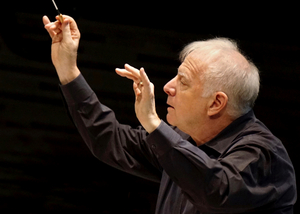Review: Review: A stirring BEETHOVEN'S NINTH with RI PHIL, PROVIDENCE SINGERS at VETS Auditorium
Was the performance impeccable? No. Was it exactly what Rhode Islanders needed? Definitely.

Listen: These are tough times. COVID-19 cases are on the rise again. Americans are bitterly divided over whether the Supreme Court should overturn its 1973 decision on Roe v. Wade, as it seems poised to do. The war in Ukraine rages on. And we still haven't found a way to halt catastrophic climate change. We - Rhode Islanders, Americans, homo sapiens - are tired and sad.
And look: Even in the best of times, Ludwig van Beethoven's Symphony No. 9 is a tough one to perform. First, there's the weight of audiences' expectations to consider; after all, this is arguably one of the most famous pieces of music in the history of the Western world. And then there's the sheer difficulty of the composition. Did Beethoven forget the limits of fast-twitch muscle fibers while writing this, or did he just wilfully disregard them? Did he have some sort of vendetta against sopranos, or did he actually think they would find it fun to sing 75 high As?
This is all to say that, when I arrived at the Veterans Memorial Auditorium on Friday, May 6, and sat down to listen to the Rhode Island Philharmonic and the Providence Singers perform Beethoven's Ninth, I wasn't expecting perfection - because we're all too tired and sad to deliver perfection. I just wanted to be moved. And I was.
Beethoven's last and perhaps greatest symphony was the centerpiece of the Rhode Island Phil's final set of concerts for the 2021-22 season. The piece was supposed to be the triumphant conclusion of Bramwell Tovey's first full, in-person season as the orchestra's artistic advisor and conductor. But those plans, like most hatched in the last two years, went awry: After missing more than one concert this season due to illness, Tovey also had to bow out of the season finale to address the side effects of a medication he is taking. Six-time Grammy winner Leonard Slatkin traveled to Providence to fill his shoes.
It's tough to cultivate a good rapport with a new conductor, no matter how excellent, in just a few short rehearsals, and I salute the orchestra and choir for their ability to make beautiful music despite the challenges they faced. Was their performance impeccable? No. Was it exactly what Rhode Islanders needed? Definitely.
In the beginning, there was palpable timidity among the musicians - hesitant entrances, fearful fortes, some muddled rhythms. But as their confidence built, so did their deftness.
By the climax of the first movement, the Phil had found its groove, delivering Beethoven's famous bombast with confidence and style. They left self-consciousness behind entirely in the second movement: The scherzo's rapid-fire "hammer strokes" landed perfectly.
When it comes to the third movement, my judgment can't be trusted; it's so moving that a middle school band could botch this and I'd still cry. But for what it's worth, I thought the orchestra nailed it, with the exception of a few melismas where horn players struggled to reach the high notes.
Not one for unnecessary drama, Slatkin let scarcely two seconds elapse before launching into the fourth movement, which features that iconic "Ode to Joy" theme that's now used in countless movies, TV shows, New Year's Eve countdowns and car commercials. Before Beethoven, no one had thought to tack a full symphonic chorale, complete with four soloists, onto the end of an orchestral symphony. It's a genius move, a means of adding yet more heft and drama to the movement's already cacophonous sound. Even with masks, the Providence Singers, joined on the risers by Artistic Director Christine Noel, employed impressive volume and forceful diction to hold their own in the chaos, mostly staying balanced with the orchestra.
The same cannot be said of the soloists, at least not across the board. Michael Dean's crystal-clear bass sounded wonderful on its own but was drowned out when instrumentalists joined in; the same went for mezzo-soprano Nina Yoshida Nelsen. Soprano Talise Trevigne's vibrato cut through the orchestra but sometimes wasn't rhythmically in sync with it. Tenor Colin Ainsworth was most successful at balancing volume and vocal quality; his voice sounded especially pleasant in duet with Dean.
So no, all was not perfect. But that didn't matter, because whether flawless or flawed, a performance of Beethoven's Ninth makes a person feel things in tough times. As the Phil's executive director David Beauchesne had explained earlier that evening, the Ninth conveys the sorrow and loss we've all experienced while also expressing boundless hope for the future. The Ninth is the sound of the world falling apart and slowly, gradually, falling back together again - mirroring the trajectory of the COVID-19 pandemic and our response thus far. In 2020, the world fell apart; more than two years later, we are still attempting to rebuild our economies and families and personal lives, still hoping beyond hope that we can return to some form of "normal" someday.
I think we need pieces like Beethoven's Ninth to remember that life - even when it's imperfect, even when we're tired and sad - is a gift. So, too, is live music, even and maybe especially when it is imperfect. Because if we've returned to a world where we can sit in chairs next to strangers and listen to musicians fall out of sync, or go flat, or come in too early, it means we're headed toward healthier and safer times. And that feels like a miracle.
Reader Reviews

Videos
